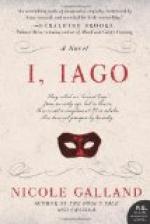|
This section contains 12,537 words (approx. 42 pages at 300 words per page) |

|
Janet Adelman, University of California, Berkeley
Othello famously begins not with Othello but with Iago. Other tragedies begin with ancillary figures commenting on the character who will turn out to be at the center of the tragedy—one thinks of Lear, Macbeth, Antony and Cleopatra—but no other play subjects its ostensibly tragic hero to so long and intensive a debunking before he even sets foot onstage. And the audience is inevitably complicit in this debunking: before we meet Othello, we are utterly dependent on Iago's and Roderigo's descriptions of him. For the first long minutes of the play, we know only that the Moor, "the thicklips" (1.1.66),1 has done something that Roderigo (like the audience) feels he should have been told about before-hand; we find out what it is for the first time only through Iago's violently eroticizing and racializing report to Brabantio: "Even now, very now, an...
|
This section contains 12,537 words (approx. 42 pages at 300 words per page) |

|


